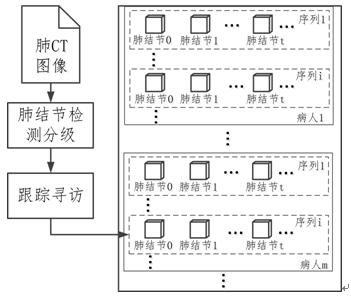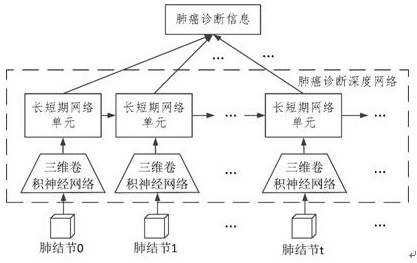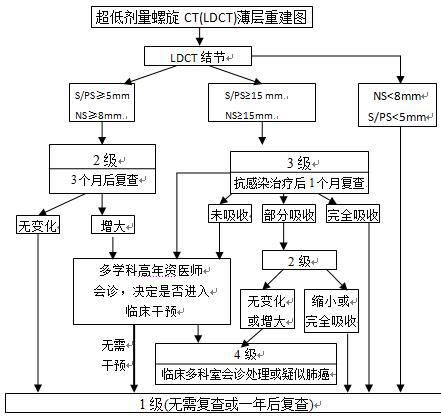Method and system for pulmonary nodule detection, grading and management based on deep learning
A technology of deep learning and management system, applied in the field of pulmonary nodule detection grading and management and system based on deep learning, can solve the problem of few references, lack of guiding value in clinical treatment of nodules, and the diagnostic effect cannot reach the diagnostic efficiency of clinicians, etc. problem, to achieve the effect of scientific hierarchical management and diagnosis
- Summary
- Abstract
- Description
- Claims
- Application Information
AI Technical Summary
Problems solved by technology
Method used
Image
Examples
Embodiment 1
[0050] Such as figure 1 , the present invention is a method for detecting, grading and managing pulmonary nodules based on deep learning, comprising the following steps:
[0051] S100: Collect ultra-low-dose spiral CT thin-slice images of the chest of several patients to form a CT image set, delineate the lung area in each CT image, and mark all the lung nodules in the lung area, and divide the lung nodules for grades 1-4;
[0052] S200: Based on the collected CT image set, as well as the lung area delineated in the CT image set, the marked pulmonary nodule and the grading information, sequentially train the lung area segmentation network, the suspected pulmonary nodule detection network, and the lung nodule screening and grading network; detect All CT images containing pulmonary nodules are obtained to obtain a CT image set of pulmonary nodules;
[0053] S300: Follow up the patients corresponding to the CT image set of pulmonary nodules, obtain the CT image sequences of the...
Embodiment 2
[0068] A pulmonary nodule detection, grading and management system based on deep learning, including a pulmonary nodule detection and grading module and a pulmonary nodule management module;
[0069] The pulmonary nodule detection and classification module includes a lung region segmentation network, a suspected pulmonary nodule detection network and a pulmonary nodule screening and classification network, which are used to accurately detect all pulmonary nodules from the image;
[0070] The lung region segmentation network is used to segment lung regions from chest low-dose spiral CT images;
[0071] The suspected pulmonary nodule detection network is used to detect suspected pulmonary nodules in the lung region;
[0072] The pulmonary nodule screening and grading network is used for screening and grading suspected pulmonary nodules;
[0073] The pulmonary nodule management module includes a pulmonary nodule management database and a lung cancer diagnosis network for diagnos...
Embodiment 3
[0077] Such as Figure 4 , for the detected pulmonary nodules, they are graded according to the clinical risk of the nodules, and the pulmonary nodules are divided into grades 1-4; if S / PS<5mm and NS<8mm, they are classified as grade 1; if S / PS 》5mm, and NS》8mm, it is classified as grade 2; if S / PS》15mm or NS》15mm, it is classified as grade 3; where S: solid nodule; PS: partially solid nodule; NS: non-solid nodule nodules;
[0078] The grade 2 nodules are reexamined after 3 months. If there is no change, they will be classified as grade 1. If the nodules increase, they will be consulted by multidisciplinary senior physicians to decide whether to enter clinical intervention. If no intervention is required, they will be classified as grade 1. Grade 1, if intervention is required, grade 4;
[0079] The grade 3 nodule will be re-examined one month after clinical treatment. If it is completely absorbed, it will be classified as grade 1. If it is not absorbed, it will be consulted...
PUM
 Login to View More
Login to View More Abstract
Description
Claims
Application Information
 Login to View More
Login to View More - R&D
- Intellectual Property
- Life Sciences
- Materials
- Tech Scout
- Unparalleled Data Quality
- Higher Quality Content
- 60% Fewer Hallucinations
Browse by: Latest US Patents, China's latest patents, Technical Efficacy Thesaurus, Application Domain, Technology Topic, Popular Technical Reports.
© 2025 PatSnap. All rights reserved.Legal|Privacy policy|Modern Slavery Act Transparency Statement|Sitemap|About US| Contact US: help@patsnap.com



